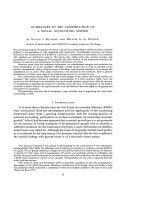LETTERS OF A BUSINESSMAN TO HIS SON
Bạn đang xem bản rút gọn của tài liệu. Xem và tải ngay bản đầy đủ của tài liệu tại đây (340.5 KB, 49 trang )
LETTERS OF A BUSINESSMAN TO HIS SON
Introduction Preface Challenge Education
On Success
Stopping the
Momentum
First Days in the
Real World
Integrity
What Is an
Entrepreneur?
Experience Employees Partnership
On Delegating
The Fine Art of
Negotiation
Marriage Business Expansion
Money Public Speaking
Manners, Attire, and
Deportment
Bank Managers
On Dealing with
Government
On the Principle of
Diversification
The Value of
Reading(1)
The Value of
Reading(2)
Teamwork On Happiness On Firing People Friendship
On Criticism
Personal Financial
Security
On Being Prepared
Stress and Your
Health
On Being a Leader That Balance in Life You're on Your Own
[20/09/07 6:10:00 AM]
INTRODUCTION
I had become somewhat desperate when my search for suitable material to follow my previous
project, "Don't Sweat the Small Stuff," came up empty-handed. Then one day as I was rearranging my
bookshelves at home, Letters of A Businessman to His Son caught my eye. I had forgotten completely
I had a copy of this 1988 book by G. Kingsley Ward.
The author is a prominent Canadian entrepreneur, who has been a highly successful
businessman since 1961. He owns eight companies with a variety of interests, primarily in the health
care field.
As you will read for yourself in the book's Preface, to be published tomorrow, Mr. Ward
underwent two major operations that made him realise he might not be around that much longer to tell
his son, J.R. Kingsley Ward, the secrets of his success. So, he wrote a series of letters ranging from
such topics as integrity, employees, delegating, teamwork, leadership. diversification, to marriage,
public speaking, manners, and friendship.
When the letters were completed, his family and friends persuaded him to have them published
and the book, bestseller in Canada, is revered by many as a must-read for all young people entering the
corporate world.
For this project, I have enlisted the talents of Nalinee and her teamwork from Loxley in
addition to Piyanut, a veteran of two projects past.
Each night I will e-mail you with directions to the Website Nalinee has designed and built.
Here you will find the new chapter for the day, which can be viewed in either the brief or full version.
This should take care of readers such as my Internet guru son who never fails to complain when made
to read anything longer than two sentences.
Posting the book on the Website will also enable readers who join us midway through to access
past chapters at their leisure.
My team and I have had a lot of fun putting together this new project. But more than that, we
beleive the wisdom and insight offered by Mr. Ward is priceless, and we would like to share that with
you.
[20/09/07 6:10:04 AM]
PREFACE
Our schools and universities teach the minutest details on the widest range of subjects, but
almost no assistance is given on many of the topics I believe are of paramount value to any
students contemplating business careers.
In my view, common sense is probably the best weapon with which to enter the battles of the
business world. Regretfully, common sense seems to elude many people during their combats-
as so often does its brother, responsibility. Yet these characteristics are the very basics of
success.
To young people entering the business world-and to some already immersed in it-I would like
to stress that learning does not stop the day you leave the classroom. In fact, your real lessons
are only beginning, and they will require more emphasis, energy, and study than ever before
if success is to knock at your door.
Attaining success requires the setting of goals in one's life. Set those down for yourself and
then carefully map the routes that will lead directly toward them. Plan your career along a
realistic path.
This book has been written in the masculine gender; father to son. However, my words are
offered to anyone interested in business-with the sincerest hope that they will be found
useful.
Dare to dream
Dare to try
Dare to fail
Dare to succeed.
[20/09/07 6:10:09 AM]
CHALLENGE
It is not a father's place to push his son in directions for which the boy has no heart; more
sons have had their lives interfered with this way than I care to think about. All I wish to
point out to you is this: we all go around this world only once so make the most of it!
Facing new opportunities that involve a change of lifestype, living patterns, usage of time, is
something many people fail to rise up to and accept.
There is a tide in the affairs of men,
Which, taken at the flood, leads on to fortune;
Omitted, all the voyage of their life
Is bound in shallows and in miseries.
WM. SHAKESPEARE
Julius Caesar
Let us examine this challenge. If you decide to try it, how much harm can it do to you? No
one is going to cut off your arm, put you in jail, or take away your motorcycle if you do not
succeed. On the contrary, if you do get your ass beat off, then welcome to the club, because I
have that happen to me in the business world very frequently to the point now that I never
give a failure a second thought. Yesterday is for dreams. I am too busy thinking about today's
battles.
Failure is both a funny and a sad thing. We worry so much about it coming our way that we
cultivate ulcers, nervous breakdowns, tics, rashes, or hot flashes. Yet on the odd occasion
when that dark day of doom does come around, we find it isn't really quite as bad as we
thought it would be; for some reason, the way our minds sometimes tend to work overtime
building up possible disasters is very often very far off the mark.
Challenge is treated differently by different people. Some people are so afraid of life they
accomplish about as much as a cow in pasture does; others thrive on challenges and are
constantly looking fo new ones. Between the two extremes is the denominator called common
sense, which should separate the challenges that lead nowhere from those that lead
somewhere. After a while you learn that challenge is a part of life and you learn how to
(1 of 2) [20/09/07 6:10:13 AM]
CHALLENGE
take it in your stride knowing that you will win most of the time, lose some of the time, but
become a better man either way for having tried.
(2 of 2) [20/09/07 6:10:13 AM]
EDUCATION
Within the framework of your formal schooling it is important for you to bring an element of
inquisitiveness to the classroom. A desire to learn makes the act of studying and learning a
delight. Too many of your fellow students are too busy complaining about the teachers and
the system to tend to their studies, which, after all, are the primary reason for being in school.
I applaud your desire to enter the business world. To a young fellow, it looks quite rosy; big
car, travel, meals in the best restaurants. I envisage your love of a dollar riding high. Well, it
is a good life if-and it is a big "if"-you find your particular niche in it, for the business world
is very large and very complex. It is also a world full of bankruptcies and of people who die
early due to its stress.
University education is designed to expand your brains, train you to work hard, teach you
how to organize your hours and days, meet many people, play sports, chase girls, drink beer,
and enjoy life. (Just don't place too much emphasis on the last three "subjects" since these
somehow seem to get ample share of one's days [and nights] with very little expenditure of
hard work or effort.)
At your age of eighteen, it is imperative to have a vision in front of you of what you want to
be doing in ten years' time. That period between twenty and thirty years of age is the most
crucial of all learning periods. If you do not get the required study you need for your future
work accomplished during these years, you will more than likely not get it done at all.
Thomas Huxley said, "The great end of life is not knowledge but action." I would add this
addendum: "-action as dictated by the use of your knowledge."
[20/09/07 6:10:16 AM]
ON SUCCESS
The work or study habit is hard to come by. It requires a natural desire to learn, it requires
practicing the art of concentration, but most of all, it requires a spirit of hard work. All these
positive, productive attitudes can easily be accomplished by 90 percent of the population.
Few accomplish them.
Successful people appear to be traveling along one continual, successful road. What is not
apparent is the perseverance it takes following each defeat to keep you on that road. No one I
know of has ever experienced one success after another without defeats, failures,
disappointments, and frustrations galore along the way. Learning to overcome those times of
agony is what separates the winners from the losers.
Morals, spirit, hard work, and responsibility are choices you must make daily. How you
decide to conduct yourself in society tests your moral fiber; how you perform on the football
field or basketball court exemplifies what type of spirit you possess; the amount and quality
of time and concentration you devote to your studies establishes diligence or lack thereof. To
all this, bring your mind to bear on each act you perform in daily living and ask yourself, "Is
this being responsible?" For in the end, how responsible you are determines how successful
you are.
[20/09/07 6:10:22 AM]
STOPPING THE MOMENTUM
You have probably noticed that pushing a car uphill is hard work. While you can stop for a
rest, you must finish the job or chances are your car will slide all the way back to the bottom
of the hill. Then you have to start pushing all over again. Work is like that. So is studying. No
matter how much you did yesterday, unless you keep chipping away at it, you lose
momentum.
After you have lived a few more years, you will observe that life is an uphill battle; as soon as
one project is accomplished, another looms up. If you are not in stride, ready to take on new
efforts, your failure rate in life will be high. That is what separates successful men from those
who never make it.
It would seem to me that an annual seven months of honest endeavor is not too much to ask
of anyone. If it is, and all you graduate with is a D- average, then you are in for a rude shock
when you come to join our company. We demand eleven-and-a-half months of honest
endeavor, and A's only are accepted in all our departments.
[20/09/07 6:10:26 AM]
FIRST DAYS IN THE REAL WORLD
Now that formal education has molded your frame of mind, it is time to apply those years of
effort to earning a living and yourown space in this crazy world of ours. You have one major
advantage going for you in that you know what you want to do: be a businessman, and a good
one.
Speaking of fine starts, getting to work on time is precisely the right start for your day now.
Nothing raises people's eyebrows or tempers faster (including mine) than a person's repeated
late arrivals at work.
Victory often goes to those who bide their time learning more, who perfect their ideas before
presenting their carefully thought-out plans to management. Should the urge strike you to
restructure our policies, bear in mind it need not all be attempted overnight (unless, of course,
it happens to be a matter of urgent importance). I am for prompt decision making, but untried
ideas require careful footing.
"Silence is golden," someone said. I concur. And in your case, a pound of listening to an
ounce of speaking is about the ratio I would recommend you adopt during this initial period
of time with us.
Aside from your knowledge of our business-which must be in your briefcase before you set
foot off our premises-instilled in your mind must be the conviction that we offer better, far
better, service to our customers than our competition does. Only half of our job is selling our
services; the other half is servicing our customers to our death. Otherwise you have to keep
finding new customers to replace the ones leaving you due to lack of service. Most
inefficient.
[20/09/07 6:10:32 AM]
INTEGRITY
As you chalk up a few more years' experience on this planet, you will realize there are few
people in whom you can place your trust completely. Therefore, a wise man arms himself
with a little ammunition: a little knowledge, or what I call safeguards for those times when he
finds himself having to place his trust in another person.
Owning integrity is owning a way of life that is strong in moral principles-characteristics
such as sincerity, honesty, and straightforwardness in your daily living patterns. In the
business world, ownership of such characteristics is the lifeblood of any long-term success.
One of the most important rules is to never give a person cause to say you did not tell the
truth, for as Ayub Khan said, "Trust is like a thin thread. Once you break it, it is almost
impossible to put it together again."
[20/09/07 6:10:36 AM]
WHAT IS AN ENTERPRENEUR?
The word entrepreneur comes from the French word, entreprendre, meaning "to undertake."
The Oxford Dictionary's definition of the word is: "a contractor acting as an intermediary
between labor and capital."
To me, entrepreneurs are people with great imaginations. They seem to have answers for
everything. No problems cannot be solved, no undertakings cannot be carried out. They are
creative in their thinking, always seeking new methods of doing things. Their innate aptitude
for avoiding the ordinary, the standard pathways of the business world, is the very crux of
their success.
Many of the ideas entrepreneurs successfully exploit are not their own. An amazing number
of people in this world have excellent ideas, but few know how to go about merchandising
them. For the entrepreneurs, it is a natural ability. They develop ideas from embryo to
consumer stage at the speed of a computer, and that swiftly paced modus operandi is one of
the main reasons most of them prefer working on their own.
Our entrepreneur is a super think tank when it comes to analyzing the risk areas of a new
project. He discerns where it is most likely to break down and zeroes in on the soft areas. If a
qualified person or company can help, he will employ them to help him narrow down the risk
factors. Undoubtedly, he will also develop an alternate plan in case the one he is using does
not work.
Only a fine line differentiates a successful entrepreneur from a successful businessman. They are somewhat
the same, of course, but the entrepreneurial personality evinces more dash, more gambling spirit, more
daring-and less adherence to the conventional pathways of business. But both must know what buyers want
and what trends are occurring in the marketplace. Constant contact with the marketplace together with an
accurate assessment of it is a winning combination.
[20/09/07 6:10:39 AM]
EXPERIENCE
The man who lacks experience and knows it must first make a resolution to himself that he
will not allow this missing factor to inhibit him or prevent him from trying to get the job
done. Having done that, it is then crucial for you to take the time to carefully assess each
project you are about to undertake-be it the analysis and solution of any given problem, the
preparation of a presentation, or anything else on your plate.
First, what and how much data have you immediately at hand? What and how much data is
missing? Should you compile more? Once you have all the facts can you possibly obtain, and
only at this point, will you be at all ready to start thinking about your possible courses of
action.
Next is the tendency to want to start analyzing the data, to get on with the job, before every
conceivable facet of information has been obtained. Then especially one needs to discipline
his mind not to start chugging away in second gear before first obtaining all the benefits of
first gear.
At the conclusion of step one, the gathering of information, it is great insurance to look
around you for a reliable person with whom you can check whether you have missed
anything.
Now comes the second step, the more exciting one: acting on the information at hand. Here is
where the experience factor really counts, because proper interpretation of your data is crucial
to your success. As the years pile up and you make your share of mistakes in the business
world-as we all do-you will find that 80 percent err in their decision making because of
mistaken interpretation of their data rather than because of a lack of data.
You have all the credentials of a good executive. Experience will make you an outstanding
one. But that is something no school, no one but you can accrue for yourself. As you win
some, be cautious and steel your mind to keep on learning-from your successes, so you repeat
them; from your failures, so you never make the same one twice.
[20/09/07 6:10:43 AM]
EMPLOYEES
A prudent employer would take the time to analyze the incentives a person might list as his
reasons for working-and most importantly, the order in which he lists them. A recent study
disclosed that money was number seven on such a list. Topping it was satisfaction in
performing the job.
An earned compliment costs nothing, but its returns are immeasurable. Very humanly, when
we are complimented, when our efforts are appreciated, most of us will usually strive to
perform even better down the line. What a return on the investment of delivering a few
earned words of praise!
As I looked around me to particularly observe, I found it highly interesting how many
different, often strange idiosyncrasies most all of us possess-and that despite all of them, we
still come together daily, work side by side harmoniously, and constitute a great work force!
Quite obviously then, molding a work force around-or in spite of-the peculiarities within us
all becomes a necessity. If we do not, there won't be a work force.
You see, it costs money to train a person for a job; for some positions within our company, a
great deal of money. If we are to operate at maximum efficiency (happens in theory only), we
must maintain a low labor turnover; otherwise all of our profits will go toward training
people if those we train consistently leave us shortly thereafter. Hence, high morale is not
only a nice, desirable atmosphere to maintain among our staff, it is a must.
Your people are your valuables. Not the bricks. Not the mortar. Not the machinery. Protect
this major investment we have in our people by doing your utmost to make them feel that top-
rated priority, that satisfaction in the performance of their jobs. If you do, you have no idea
what increased feelings of satisfaction you will experience carrying out your own job. And I
will smile at the resultant escalating profits.
[20/09/07 6:10:46 AM]
PARTNERSHIP
I hear your friend Harold has approached you with a fantastic money-making idea in another
industry-one very different from ours. Also, via the grapevine, I was given to understand you
are being invited into the partnership because of the prosperous business you and I happen to
be in.
Without the slightest intent of any put-down, I must admit the first thought that comes to
mind is your family's money-because it seems to me that whenever people come up with new
business ideas, they are most adept at solving all their production and marketing problems,
but their brains go into deep freeze when it comes to finding the money to get their projects
off the ground.
So it appears logical to me that Harold will have to run the business since your new company
cannot afford to hire a qualified professional manager at this juncture. Now what do you have
in your hands? Harold spending your money, with you at a distance. It could be a fine
arrangement if Harold knows what he is doing. At thirty-two years of age, he could be one of
those rare birds who comes along without the benefit of any business training or experience
and instinctively knows how to run a business. But I am inclined to think not.
You will be one of four equal partners, the one putting up the money. Harold will be
president, Charlie will sell, and Fred will produce the product. Initially, the efforts of all will
be very strong and very dedicated; everyone will be pitching in for all he is worth. Unhappily,
as time goes on, most foursomes lose one or two of their members' endeavors to the wayside-
even if the business happens to be prospering. It is inevitable. When the going gets tough,
those 70- to 80-hour weeks get to somebody-or somebody's wife-and in jumps "the beginning
of the end."
Memories can be very short. Your financial contribution to get the company off the ground
will not be very long remembered with robust gratitude. You will discover only too soon that
your partners' primary interest is asking, "What are you doing for us today?"
[20/09/07 6:10:57 AM]
ON DELEGATING
I know no faster way of improving our businesses' worth than by delegating to every willing
and able body as much as he or she can handle-and then some, for as each person's work
capabilities grow, so will our business grow.
The first precept of sagacious delegation is a careful, in-depth assessment of your personnel's
talents, ambitions, and desires. Given the chance, most people will surprise you with what
they are capable of achieving. And you can bet your bottom dollar, the day they're assigned
their new responsibilities, they will be walking ten feet tall.
Now for the second precept. Permitting your staff to assume more important duties entails
something you probably never thought of doing: teaching. Simply and fundamentally, putting
together a set of tough, competent executives and a dedicated, strong staff requires teaching.
The most successful businessmen are often extremely good teachers.
Now your key to ultimate success is the development of a system of control over all the
realigned duties. This means establishing a method of communication between you and your
personnel whereby you will be kept posted, up to date, and on the alert to spot trouble areas
or correct a mistake. Above all, maintain a confidence in your heart that your trainees can and
will do their new jobs well.
Building a business is like trying to build a pyramid-in reverse. You are the top stone. How
many sturdy, supportive levels of stone eventually form the foundation beneath you depends
on your ability to select, train, trust, supervise, or promote the members of your work team.
It's a pity how many a businessman fails to grasp this, fearing it might jeopardize his own
lofty (soon to become shaky) pinnacle.
[20/09/07 6:11:05 AM]
THE FINE ART OF NEGOTIATION
Why are some people more adept than others in this important area of business? I believe I
can capsulize my opinion in a simple formula. It is:
F - E = S FLEXIBILITY minus EMOTION equals SUCCESS
Flexibility is nothing more than being able to read the intensity of the other fellow's desire
and then bending to it as much as one might have to in order to reach a successful conclusion.
It's somewhat like a tree in a windstorm; it bends but seldom breaks, then stands taller than
ever the day after the storm
Often emotion is much more difficult to harness than flexibility, be it your own or your
adversary's. I would like to have a dime for every contract that was lost because of emotion.
People so often tend to dig in their heels on the most ridiculous of points-usually only to
prove that they are not going to be pushed around by anyone.
There are three rules to follow in practicing the fine art of negotiation. One: conduct a fact-
finding mission. Gather all the information you can on the other party's position, and match it
with your own data.
Two: study the information you have culled and weigh each point on a scale of one to ten.
Try to weight the points two ways. First, define your assessment of each. Secondly, put on
your opponent's hat and try to weigh each fact from his point of view.
With enough study you should be able to draft a chart, labeling your facts in the order of their
particular importance.
Three: divide a page in two and, from your chart, list all the negotiable points on one side and
the points over which you will not budge on the other side. Keep this latter side short. List
too many here, and you will have cornered yourself into an inflexible role.
Situations do and will arise wherein you find yourself forced in accept the other fellow's
(1 of 2) [20/09/07 6:11:10 AM]
THE FINE ART OF NEGOTIATION
inequitable terms. Your back will have been pushed up against a wall, and if for no reason
but to clear the matter off your desk, you will find yourself settling for his biased conditions.
Naturally, you will feel you lost the game at such times, and maybe you did-but my
experience has been that never, on the next go-round, did that person not try to make amends
for what he knew had been an unfair settlement.
(2 of 2) [20/09/07 6:11:10 AM]
MARRIAGE
Martin Luther said there is no more lovely, friendly, charming relationship, communion, or
company than a good marriage. I agree. However, it must be viewed as a hellishly serious
commitment! Although marriage is, in a sense, primarily an attraction of nature's forces, the
binding is what ultimately counts-but that only occurs in its own good time.
A very old and learned doctor friend and I once shared a conversation about marriage. He
opined that marriage should be viewed and treated as a business; that in marriage, just as in
any business, if two equal partners contribute equal input, it will thrive; if one or the other or
both parties shirk major responsibilities or repeatedly fail to live up to their end of the
bargain, it will, sooner or later, collapse into "bankruptcy."
You should select a person who has a warm, likable personality; observe if there are any
mean or envious tendencies, for these can create havoc later; a gossipy nature should be
shunned; a greedy nature, avoided like a plague.
Although in truth, beauty is only skin deep, it is rather nice to look at every morning,
especially if it combines beauty of spirit. But far more important for your sake, I hope that
she is wise, strong, considerate, and true, that she is kind and thoughtful, cares about such
things as values and manners and stimulating conversation, and that she never once misses
such special things as a smile or a child's first step or a glowing sunset. But most of all, I
hope she has the capacity, as a true partner, to give and take in harmony with you.
If during your search you discover a rare gem, remember, "Faint heart ne'er won fair lady."
But pursue the fair lady's hand with some careful planning from the head as well as from the
heart.
Women like a thoughtful man. Bear it especially in mind when that very special someone
comes along-if you want to see her again past your first date.
Once having "tied the know," I highly recommend you allot family time and business time in
wise proportions on your mental time clock. Allotting too much time in either direction can
(1 of 2) [20/09/07 6:11:15 AM]
MARRIAGE
be unhealthy-and be especially wary that the business side does not far outweigh the other
right after the honeymoon.
(2 of 2) [20/09/07 6:11:15 AM]
BUSINESS EXPANSION
The expansion of our business has recently been running at about 30 percent per year. We
have, in my humble opinion, been about as greedy as one should get. Any good businessman
needs some length of a greedy streak in him to keep him sharp-but there is no greater or more
unhappy business disaster than stepping into the ring of the supergreedy.
At our present rate of growth, the purchase of new equipment and plant expansion eats up
virtually every cent we make in profit after taxes as well as the amounts I wriggle out of the
bank manager. Considering our bank debt goes higher each year, we are not exactly lying still
in the stream. The repayment of this borrowed money plus the interest payments will require
some years of work.
Once over the financial hurdle of being able to make enough money to cover our investment
debt, there looms the problem of training new people to ensure the products we put out are
consistently of the same high quality we have always produced.
There are some businessmen who hold to a theory that sounds rather negative in today's
world of ever-building, bigger and better. It goes something like this: once having developed
a business to a successful profit point, you have obviously overcome the major hurdles of
covering your debt cost and all the attendant agonies of building your business; you have
gone through the roughest and riskiest times during the building of your business-when the
loss of a major customer, a key employee or two, or a rejected product batch could have done
you in. Now you are not going to budge. You will not expand because it is too comfortable
sitting back, feeling safe and content that you now have the business at a level wherein it
could survive one two of the aforementioned downturns.
One must take into account that every time a major expansion is undertaken, it is almost like
starting all over again. You have to dig up that required extra business and keep it. Then you
have to earn a lot of profit on it to pay for the expansion.
Some businessmen choose to adhere to the principle of continual growth done at a pace that
never puts the company out on a limb. This requires a tight rein on your ambition-plus my
motto, "Do not get too greedy."
(1 of 2) [20/09/07 6:11:27 AM]
BUSINESS EXPANSION
(2 of 2) [20/09/07 6:11:27 AM]
MONEY
There are two uses for our money: to invest it for our business and look for that return, and to
spend it for happiness-whether the return is a nice piece of furniture to look at over the years
or even a hangover on some of those "days after." What is not a proper use of our money and
would perturb me most would be spending it to try to impress people.
If you give your customers the impression you are a Big Spender, you might turn a lot of
them off. It could not help but cross their minds that what you are spending are the profits
from the business they have given us-and if it is in too grand and glorious a manner, it could
also not help but cross their minds that maybe our prices are too high.
A lot of people envy people with money. I know a little about that feeling because I have
been rich, and I have been poor-and I want to tell you, being rich is better. But it is lonelier,
too, and tougher to keep your true friends or develop honest and loyal new ones.
The first dollar you make is like a seed. Planted well, and with some good help from the
Good Lord, it will grow, and the following year you will reap two dollars. Remember, it is a
very long way to that first $100,000-usually much longer and much more difficult to travel
than to your second million.
Making money is a slow process; losing it can happen quickly enough to make your head
spin. Therefore, once you have found the right track for making a dollar, don't start playing
around with your winning pattern just for variety's sake or a change of scene.
When next at one of your dinners, parties, or meetings, keep a running tab going on your
reputation-something far more valuable than any amount of money. Practice a quiet
balancing of your personal wallet and a quiet intelligent art in the handling of the company's
wallet. Fame and money can be but fleeting moments in one's life; truth and an honest
reputation are the stays of a valuable life. No one has ever been able to purchase such
ultimate treasures as a good family, sound health, true friends, loyal employees, true love-or
true respect.
[20/09/07 6:11:35 AM]
PUBLIC SPEAKING
How well you are going to perform as a public speaker is still an unknown, but some things
we do now for sure. For instance, we know you have the first basic ingredient, a mouth; the
second ingredient, your mind (at least when I last noticed); and third, two feet on which to
stand.
How you send your words from your mouth is very important. Practice your enunciation so
you pronounce your words distinctly enough for people to understand easily what you are
saying.
Prepare your speech now, for practicing your delivery will take a lot longer. Start that by
reading your speech out loud and asking someone to listen and tell you which words are not
coming across clear enough.
Practice standing behind a lectern (the bedroom dresser will do), in front of a microphone.
(Use anything to simulate this, but be certain it is not more than six inches from your mouth.)
The really great orators have one further arrow in their quiver: breathing technique. Take a
deep breath and deliver whole sentences or complete clauses of long sentences at one time.
Do not—I repeat, do not—start a sentence half out of breath, then run out of breath
completely half way through a word or on some meaningless preposition. That makes for
terrible delivery.
One easy way of controlling a case of shaking knees and a pounding heart is to place both
your hands firmly on either side of your lectern. You will be amazed what physical support
that will give you.
You will notice most of your nervousness disappearing after you make only a couple of
public speeches if, and it’s another big "if," each time you speak, you have the confidence of
knowing you did all your homework, you prepared a good text, and you now have something
valid to share.
(1 of 2) [20/09/07 6:11:43 AM]
PUBLIC SPEAKING
(2 of 2) [20/09/07 6:11:43 AM]
MANNERS, ATTIRE, AND DEPORTMENT
If one is willing to spend four to six years learning a profession, why not take another week
or two and learn a few principles about clothes, manners, and the art of conversation? Even if
there has been no formal education, why not learn some of the fundamental rules of society
that might readily assist your landing a job in the first place, or moving up the corporate
ladder in the second place?
Nothing is more potent in a man’s arsenal of attributes than first, knowledge, of course, but
secondly, good manners. Seems to me a great many people only go half way preparing
themselves for the business world.
If you counted the times you say "please" in a day in relation to the number of requests you
make of your employees, telephone operators, store clerks, whomever, I would bet you could
increase your usage of the word tenfold.
Some manners greatly influence how happily and productively people carry out your
directives. Ask and you shall receive; demand and you will get less. If your approach sounds
more like reproach, you will get back a lot less still.
A common bad manner—interrupting someone while he is speaking—is a conversational
habit that diminishes a lot of people’s images in my eyes. This is a tactless and frustrating
insult to the person speaking.
Many a person’s conversation is limited to one subject: "me." Nothing is as boring or
impolite as verbally bombarding a listener with trivia about yourself.
Three physical habits either particularly impress me or completely turn me off, respectively,
upon first meeting a person. First and foremost, a firm or limp handshake. Second, looking
me in the eye while speaking or listening to me—or gazing out at the steno pool. Third, good
or poor posture.
[20/09/07 6:11:53 AM]









